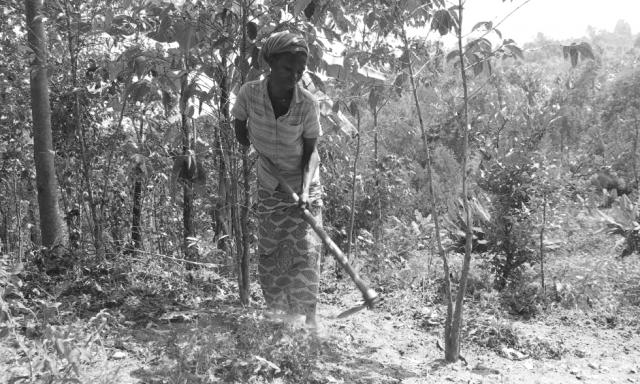

 Article
Article

 Lake Kivu Coffee Alliance supports Congo landmine victims with training, peer support and economic inclusion. It is a leading public partnership and finalist for the 2018 P3 Impact Award.
Lake Kivu Coffee Alliance supports Congo landmine victims with training, peer support and economic inclusion. It is a leading public partnership and finalist for the 2018 P3 Impact Award.

Insights from
Written by
The Darden School of Business’ Institute for Business in Society partners with Concordia and the U.S. Department of State Secretary’s Office of Global Partnerships to present the annual P3 Impact Award, which recognizes leading public-private partnerships that improve communities around the world. This year’s award will be presented at the Concordia Annual Summit 24–25 September 2018. The five finalists will be highlighted on Darden Ideas to Action on Fridays leading up to the event.
Lake Kivu Coffee Alliance
Workforce
Ongoing unrest and armed conflict have plagued the Democratic Republic of Congo (DRC). Decades of violence have left the population without adequate health care, education, sanitation and potable water — but with the threats from landmines and explosive remnants of war (ERWs).
Landmines and ERWs afflict 10 of the top coffee-producing countries in the world. The DRC was once a burgeoning coffee-producing area, but the lasting conflict and presence of ERW hazards have held back what could be a promising local industry and source of prosperity for local communities. Landmines and ERWs devastate the lives of coffee farmers, the majority of whom are women. ERWs not only kill or maim the farmers, but also prevent them from accessing water and arable land and limit travel, impeding their ability to bring their product to market. Injured farmers often lose their land, livelihoods and sense of purpose, leaving them marginalized in their communities and vulnerable to not just rebel violence, but also extreme poverty and disease.
The Lake Kivu region in eastern DRC is called “a paradise for coffee” due to its perfect location for farming coffee: latitude, altitude and rainfall. Despite coffee production being decimated by conflict, corruption and lack of private investment, the DRC has significant potential to meet the rising global consumer demand for specialty coffee. Recognizing this potential, the Lake Kivu Coffee Alliance was formed with dedicated partners from the public and private sectors working toward a common goal: using specialty coffee’s growing market share to improve the lives of conflict victims and other coffee producers living in poverty along Lake Kivu.
Lake Kivu Coffee Alliance developed a comprehensive program that cultivates, processes and commercializes coffee grown in a region heavily impacted by landmines and ERWs. The program addresses the unique needs of conflict survivors, such as rehabilitation and accessibility, while also increasing coffee production and expanding market share to promote economic and social development.
The partners determined that coffee farmers who suffer limb loss, psychological trauma or other disabling conditions from ERWs are able to return to coffee cultivation or work in other areas throughout the coffee value chain after receiving physical and psychosocial rehabilitation.
Only 20 percent of the population in need of rehabilitation services in Lake Kivu are able to access them, so one of the main goals of the program is to increase the accessibility, availability and quality of victim assistance services.
Other goals include providing artificial limbs and prosthetic training, developing peer support associations and redesigning coffee processing facilities using “universal design” principles to increase job opportunities for ERW victims.
The Lake Kivu Coffee Alliance has only existed for six months, but has already provided prosthetic limbs and rehabilitation training to ERW survivors, helped incubate three victim associations, facilitated workshop and training programs on disability inclusion and victim assistance capacity building, and provided mine-risk education in several communities.
Building training facilities that can accommodate victims and providing opportunities to work in accessible job sites increases income for coffee producers. It promotes social and economic inclusion for victims with disabilities so they are able to regain their mobility and their dignity.
DRC’s coffee industry has the potential to bring hope and better livelihoods to battle-scarred farmers living in the fertile highlands of Lake Kivu.
For decades, U.S. companies have undertaken efforts to increase diversity in ownership and operation of companies in their supply chains. These efforts are motivated by the need to leverage the differences that are relevant in the social context in which the company is embedded. In the U.S., this has taken the form of companies seeking out suppliers owned and operated by women and minority business owners.
For the Lake Kivu Coffee Alliance, the military, political and social turmoil in the DRC helps define the differences that, if engaged, can heal communities and provide economic renewal. By working with diverse suppliers in the community, companies help transform ineffective or harmful practices, encourage employment and support economic empowerment in the community.
Davidson is an expert on global leadership with an emphasis on how to manage diversity to generate superior performance — an approach he pioneered called Leveraging Difference. He wrote the book on diversity in business, The End of Diversity as We Know It: Why Diversity Efforts Fail and How Leveraging Difference Can Succeed. He’s experienced in helping senior leaders develop the skills they need to thrive in global environments.
Davidson consults with a host of Fortune 500 firms, government agencies and social profit organizations. He has served as chief diversity officer for the Darden School, and as the national chair of the Gender and Diversity in Organizations Division of the Academy of Management. Davidson writes a blog called “In My Opinion,” found at www.leveragingdifference.com.
A.B., Harvard College; Ph.D., Stanford University
Lake Kivu Coffee Alliance: A Public-Private Partnership